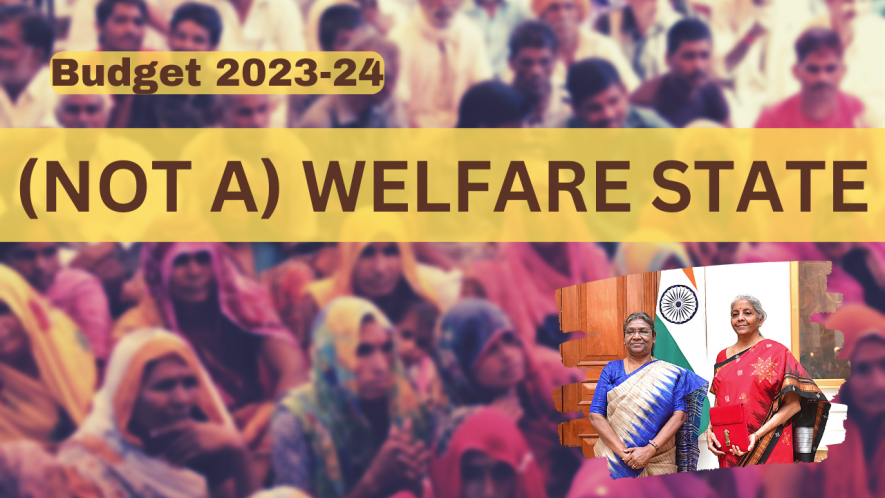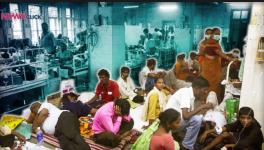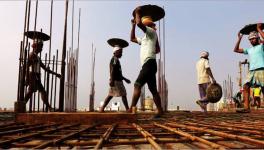Union Budget 2023-24: Govt Slashes Welfare Spending in ‘Amrit Kaal’

The first Union Budget of ‘Amrit Kaal’ has announced an onslaught on the interests and rights of the working people of the country. Allocations for a slew of schemes and programmes that support livelihoods and work, food and nutrition, old age pensions, farmers’ needs and children’s welfare have been slashed or trimmed.
There is no reason to do so except that the present government believes in overtly and explicitly supporting the wealthy and the privileged sections while perhaps believing that these ‘wealth creators’ will ensure that the poor who serve them will automatically benefit from some fabled trickling down of prosperity. This belief has been junked time and again in countries across the world – but as long as people swallow it, it will go on determining fiscal policy. Modi hai to mumkin hai, (With Modi, Everything is Possible) as the slogan goes!
Allocation for the popular rural job guarantee scheme (MGNREGS) that has become a lifeline for lakhs of persons desperately looking for jobs, has been drastically slashed to Rs.60,000 crore for the coming year compared with Rs.89,400 crore spent last year as per the revised estimates (RE). That’s a deep cut of 33%.
It is often argued by sarkari spokespersons that MGNREGS is a demand-driven scheme and demand is falling. But this is far from the truth, as can be seen from the fact that over 8 crore persons have already worked in the scheme this year compared with 7.9 crore in the last pre-pandemic year of 2019-20. During the pandemic years of 2020-21 and 2021-22, as is well known, the number of persons who worked had shot up to 11.2 crore and 10.6 crore, respectively. So, the present slashing of allocation will lead to widespread distress in rural areas – among people who are already deeply distressed.
Another livelihood related scheme that has suffered a marginal cut is the National Livelihood Mission – Ajeevika, which has received Rs.14,219 crore compared with Rs.14,236 crore last year, out of which the government was able to spend Rs.13,886 crore. So, in effect, there is a decline in allocation of 0.75% compared with last year’s allocation.
Farmers were promised that their incomes will double by 2022, which doesn’t appear to have happened. They also fought a long and arduous battle against the government’s plan of corporatising agriculture through the now infamous three laws. The government was forced to withdraw these laws though it has been dragging its feet on the key demands for guaranteed support prices. In the Budget, none of the concern of farmers appears to be reflected as the two major schemes have had their allocations cut, while the all- important fertiliser subsidy seems to have been slashed dramatically.
The PM Kisan Samman Nidhi (PM-KISAN), which provides Rs.6,000 cash handout to small and marginal farmers every year and was started in the run-up to the 2019 general election, has received Rs.60,000 crore, down nearly 12% over last year’s allocation of Rs.68,000 crore.
Another crucial scheme for irrigation, called PM Krishi Sinchai Yojana, has received Rs.10,787 crore while last year it got Rs.12,954 crore. That’s a cut of nearly 17%. Interestingly, last year, the government didn’t even manage to spend the amount it had allocated, ending up with a total expenditure on this scheme at Rs.8,085 crore.
But it is in the fertiliser subsidies that the cruelty of the government's fiscal squeeze becomes all too clear. Urea subsidy has been slashed from Rs.1,54,098 crore last year to Rs.1,31,100 crore this year, a drop of nearly 15%. Nutrient- based subsidy has been reduced by over 38% from last year’s Rs.71,122 crore in the revised estimates to Rs.44,000 crore. High fertiliser prices happened because of the war in Ukraine and the consequent disruption in fertiliser supplies. There is no reason to believe that things will go back to normal in 2023-24. Yet the government has slashed the subsidy, which will further worsen the farmers’ already meagre earnings.
Food subsidy also appears to have been severely curtailed with cuts in subsidy to the Food Corporation of India (FCI) which handles procurement, storage, transportation of essential foodgrains to the Public Distribution System (PDS). Last year, Rs.2.15 lakh crore was provided to FCI to cover their expenses. This year, it has been reduced to Rs.1.37 lakh crore, an enormous decline of 38%.
Another component of food subsidy that has suffered cuts is the one provided for decentralised procurement of foodgrains. This has been cut from Rs.72,283 crore (RE) to just Rs.59,793 crore in this year’s Budget, a steep reduction by 36%. Perhaps, this is happening because in the current year the whole procurement-PDS distribution chain has turned into shambles because of a drastic drop in wheat procurement following the export mirage which turned into a nightmare after the war in Ukraine broke out last February. Instead of preparing for a similar scenario this year, the government is using this crisis to dismantle the whole system – a cherished dream that it has had for long.
The National Social Assistance Programme (NSAP), which includes such important components as old age and widow pensions etc, has suffered a marginal cut from last year’s allocation and revised estimate of Rs.9,652 crore to Rs.9,636 crore – a decline of 0.17%. Considering that the allocations have been consistently far below the desired level, this cut indicates that the government has no intention of caring for the underprivileged and needy senior citizens.
This lack of social-economic concern reflects much more flagrantly in the case of allocations for minorities and for dalits and adivasis. The umbrella programme for development of minorities has seen a shocking reduction of allocation from Rs.1,810 crore last year to just Rs.610 crore for 2023-24. That’s a decline of over 66%. Note that last year – 2022-23 – the government managed to spend merely Rs.530 crore out of the allocated Rs.1,810 crore. This in itself shows the grossly negligent, if not indifferent, attitude toward budgetary help for the welfare of minorities.
The umbrella programs for development of SC (Scheduled Castes) and ST (Scheduled Tribes) communities have, respectively, seen an increase of 8% and 4.5% in allocation for 2023-24 compared with the previous fiscal. These are just symbolic in nature, as inflation would effectively wipe out such measly increments. In other words, the government doesn’t seem to have much concern for these two most oppressed sections of the population.
The Mid Day Meal programme, renamed as PM Poshan Shakti Nirman, has received Rs.11,600 crore for the coming year compared with Rs.10,234 last year, although the revised estimates suggest that actually last year Rs.12,800 crore was spent on this key programme for children’s nutrition. So, compared with last year’s spending, this year’s allocation has dipped by over 9%. This will not only affect the nutritional status of primary school children but may also result in increasing drop-outs.
The umbrella ICDS (Integrated Child Development Scheme), which includes giving nutritious meals to children up to the age of 6 years through lakhs of anganwadis, has received a meagre increase in allocation of 1.4% over last year – from Rs.20,263 crore to Rs.20,554 crore. Considering the pitiable wages or ‘honorariums’ given to anganwadi workers and helpers and complete lack of other benefits, this is a clear signal that the government is unwilling to provide a dignified wage to these key functionaries. In fact, even the food cost will not be covered by this measly increase because general inflation is running at 5-6%, and for food items it is even higher.
This short survey of this year’s Budget reveals the hubris of the Narendra Modi-led Bharatiya Janata Party government, which perhaps thinks that its commitment to fiscal tight-fistedness – as demanded by the corporate sector and foreign capital -- will be compensated by pseudo-nationalist rhetoric and bigotry. Whether this will indeed be the case, or the people will get fed up of economic misery, will become clear in the coming months and years.
Get the latest reports & analysis with people's perspective on Protests, movements & deep analytical videos, discussions of the current affairs in your Telegram app. Subscribe to NewsClick's Telegram channel & get Real-Time updates on stories, as they get published on our website.























